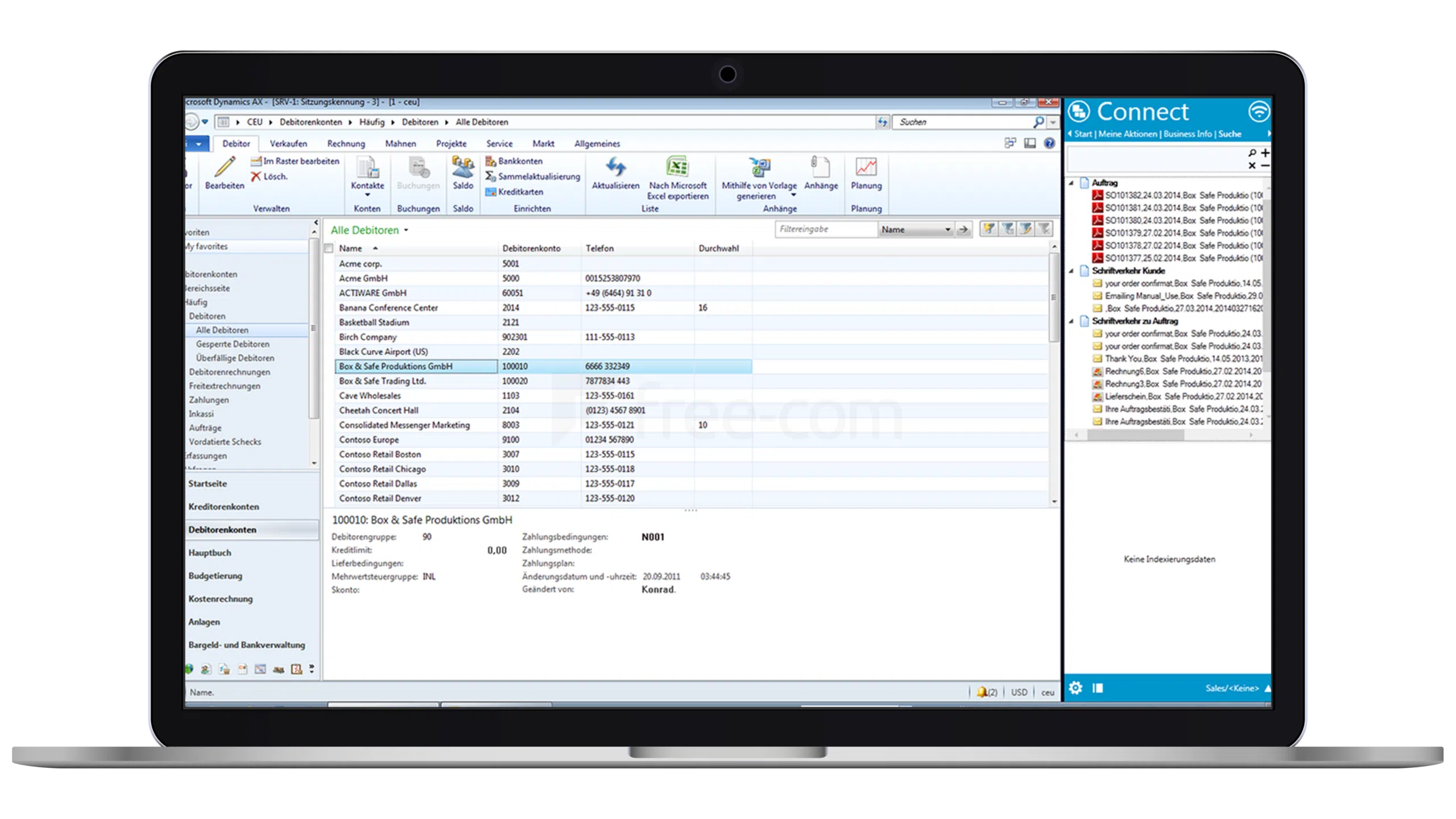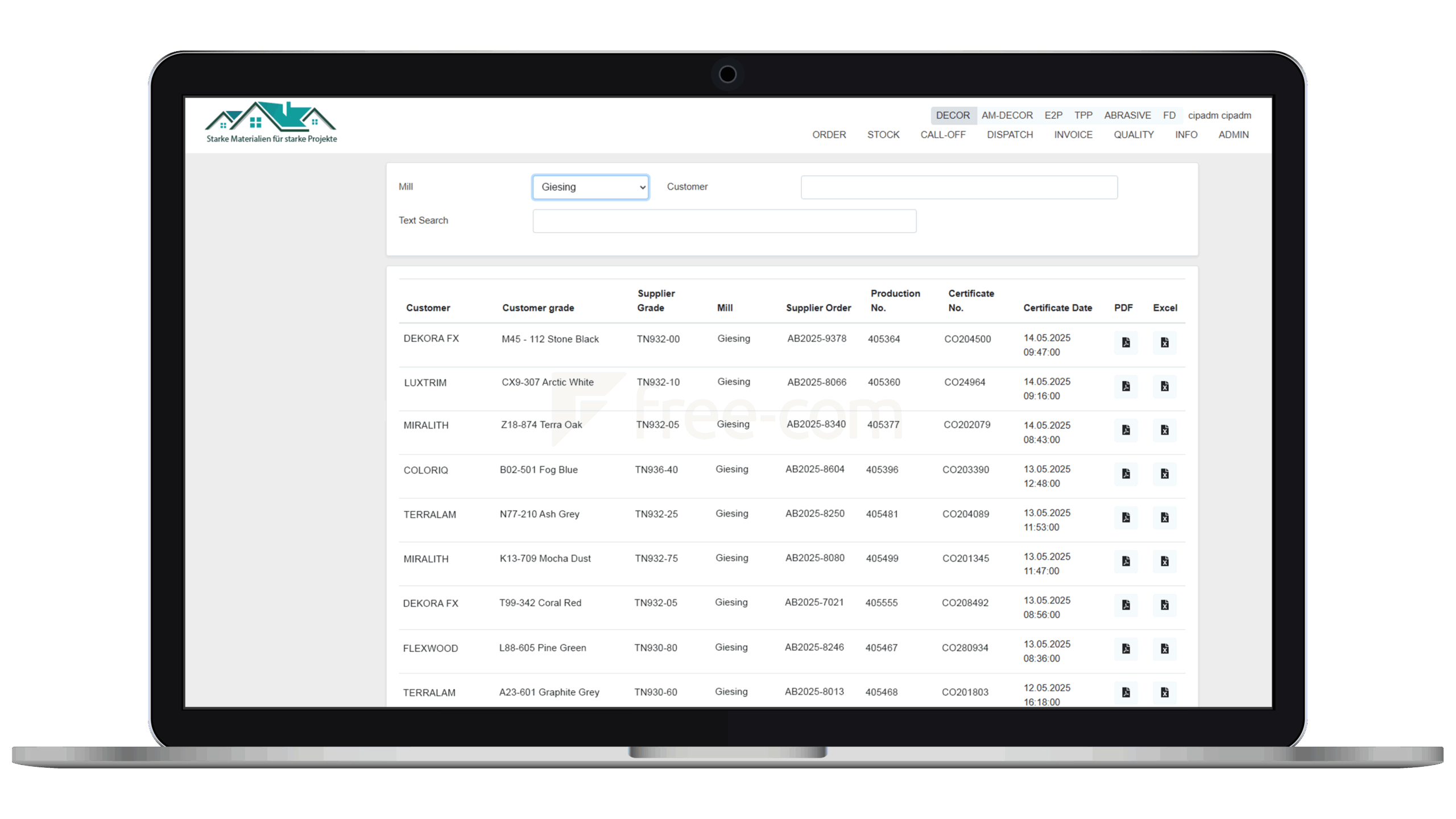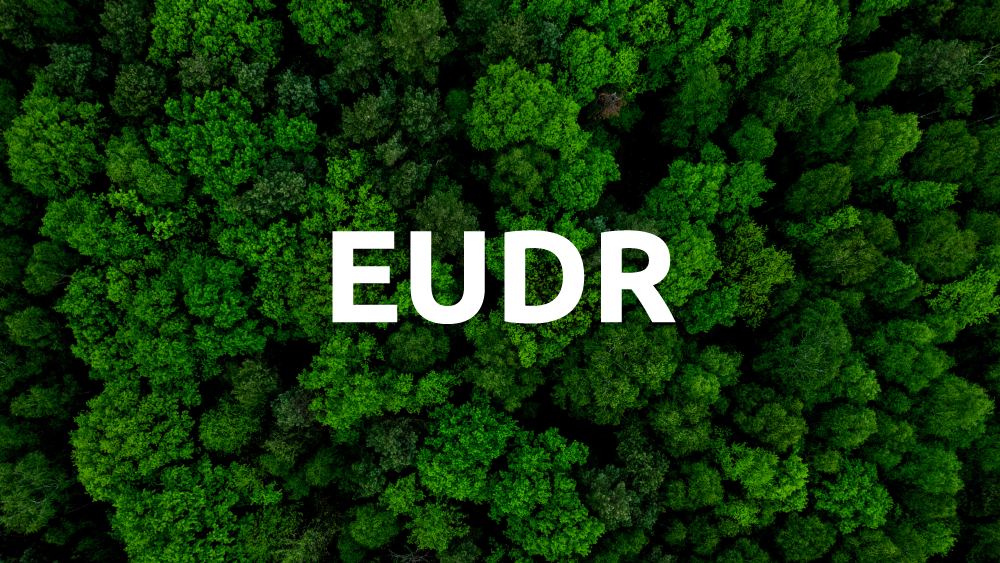Mastering EUDR Compliance: Requirements, Benefits, and Challenges
Veröffentlicht am 30.10.2025
Lesedauer: 15 min
Contents
- What is the EUDR and What is it About?
- Which Industries and Companies are Affected by the EUDR Regulation?
- What does the EU Deforestation Regulation Mean for Companies? Obligations & Compliance Requirements
- Advantages & Challenges of EUDR Compliance
- How free-com Supports Companies with EUDR Compliance
- Conclusion: EU Deforestation Regulation as an Opportunity for Sustainable Supply Chains
- FAQ on the EUDR
Inhalt
- What is the EUDR and What is it About?
- Which Industries and Companies are Affected by the EUDR Regulation?
- What does the EU Deforestation Regulation Mean for Companies? Obligations & Compliance Requirements
- Advantages & Challenges of EUDR Compliance
- How free-com Supports Companies with EUDR Compliance
- Conclusion: EU Deforestation Regulation as an Opportunity for Sustainable Supply Chains
- FAQ on the EUDR
What is the EUDR and What is it About?
The EU Deforestation Regulation (EUDR) is an EU regulation that came into force in June 2023 and imposes strict conditions on trade in certain raw materials and products. Companies wishing to trade in soy, palm oil, cattle, coffee, cocoa, rubber, or wood or products made from these commodities in the EU must therefore prove that these goods are deforestation-free. Specifically, this means that no forest has been cleared for the production of the raw material since the cut-off date of December 31, 2020, and that the laws of the country of production have been complied with.
The aim of the regulation is to stop illegal deforestation and protect the climate and biodiversity. The EUDR is therefore an important step towards sustainable supply chains within the framework of the European Green Deal.
The EUDR was adopted at the end of 2022, but its application is currently only planned for December 30, 2025 (for large and medium-sized companies) and June 30, 2026 (for micro and small companies). A one-year postponement of this deadline is being discussed, but has not yet been decided (as of October 2025).
Update December 2025: The one-year postponement has now been officially decided. This means that the regulation will not apply to large and medium-sized enterprises until December 30, 2026, while the new deadline for micro and small enterprises is June 30, 2027. In addition, further concessions have been agreed for micro and small enterprises: The reporting obligation now only applies to companies that are placing products on the EU market for the first time. Downstream micro and small enterprises only have to store the reference numbers (and no longer pass them on as planned) and submit a one-time, simplified declaration. They will then receive a unique identifier that ensures traceability.
Detailed information about the EUDR can be found in our glossary article.
Which Industries and Companies are Affected by the EUDR Regulation?
The EU Deforestation Regulation affects numerous companies and industries along global supply chains. This is particularly relevant for:
In principle, the EUDR covers companies of all sizes and origins that trade in listed goods in the EU, regardless of whether they are based in the EU or import the goods from third countries. Micro and small enterprises have an extended deadline for applying the regulation and, in some cases, simplified due diligence requirements (see below). However, they are not exempt from responsibility. In Germany alone, around 370,000 companies are subject to the regulation.
In addition, the regulation has an impact along the entire supply chain: suppliers outside the EU are also affected. They must provide the necessary proof of origin in order to continue serving the EU market. Companies in downstream industries (e.g., food manufacturers) could feel the effects of this in terms of the availability of raw materials.
What does the EU Deforestation Regulation Mean for Companies? Obligations & Compliance Requirements
EUDR compliance means setting up a comprehensive compliance program to seamlessly verify and document the origin of products. Essentially, companies must meet the following requirements:
Introduce a due diligence process
Companies must establish a structured due diligence process. This comprises at least three stages: gathering information, conducting a risk analysis, and, if there is a significant risk, taking measures to mitigate that risk.
All relevant data on a product and its origin must be collected, including product descriptions, quantity, country of production, suppliers, geographical coordinates of the cultivation areas, and proof of legality. The risk that the product is linked to deforestation after 2020 must then be assessed. If the risk is not negligible, additional steps must be taken, such as investigations using satellite monitoring, independent audits, or, if necessary, the replacement of unreliable suppliers.
This process must be integrated into company procedures and reviewed regularly, at least once a year.
Companies that are exclusively active in trade and are classified as micro or small enterprises are subject to fewer obligations. They do not need to introduce their own due diligence process as long as they source their products from EUDR-compliant suppliers. Their obligation is limited to collecting and documenting basic information about their suppliers and customers, as well as the reference numbers of the respective due diligence declarations.
Submit a due diligence statement
A due diligence statement must be submitted for each product concerned before it is imported into or exported from the EU. This statement must be submitted electronically to the authorities via the new EUDR information system. In it, the company confirms that it has complied with the mandatory due diligence requirements. In addition, the collected documents, including the risk assessment, must be uploaded. Only products that have been successfully registered may be placed on the market in the EU.
Documentation and retention requirements
All information and evidence, including satellite images, supplier declarations, audit reports, and all other documents, must be documented in full and retained in an audit-proof manner for at least five years. This retention requirement ensures that companies can prove their compliance in the event of a random official inspection.
Organizational anchoring of the EUDR & responsibility
The Deforestation Regulation requires that the entire due diligence system be appropriately anchored in the corporate organization. EUDR compliance is therefore a permanent part of governance and must be planned accordingly.
Larger companies should appoint internal officers to monitor the implementation of EUDR requirements. These compliance officers must be able to act independently, review the due diligence strategy, and carry out internal controls.
Penalties for violations
Non-compliance with the EUDR will be severely punished. Although the regulation does not specify the penalties in detail—this is left to the individual EU member states—it does stipulate minimum penalties. For example, fines are set at a minimum of 4% of the company’s annual turnover. In addition, non-compliant goods and any profits generated from them may be confiscated. Companies may be temporarily excluded from public tenders across the EU or even banned from trading. Last but not least, all companies that have committed a legally binding violation will be officially published by the EU and thus “pilloried.” Compliance with the regulations is therefore urgently necessary in order to avoid massive financial damage and loss of reputation.
Tip
Implementing these obligations can be complex and resource-intensive. However, companies can automate, simplify, and accelerate many work steps with the right software solutions. For example, through the automated digitization of supporting documents, the establishment of efficient archiving, or a 24/7 document self-service system. You can find out more about this in the section below. Feel free to contact us for a no-obligation consultation on your EUDR compliance.
Advantages & Challenges of EUDR Compliance
The EUDR presents both opportunities and challenges for companies. On the one hand, it forces companies to make their supply chains more transparent and sustainable. In the long term, this is expected to have positive effects on risk management and brand image. On the other hand, implementation requires considerable investment in setting up the IT infrastructure, the necessary processes, and additional communication with suppliers.
Benefits of EUDR compliance
- Greater supply chain transparency and risk minimization: Companies gain detailed insights into their supply chain, right down to cultivation areas and farms. Early risk detection (e.g., illegal deforestation) becomes possible, which reduces supply risks and increases supply chain resilience.
- Improved brand image & customer trust: Sustainable procurement pays off in terms of public perception. Companies that offer deforestation-free products strengthen their brand and gain the trust of customers and investors who are increasingly looking for environmentally friendly supply chains. Companies that are EUDR-compliant can use this as a unique selling point in their brand communication.
- Contribution to sustainability and ESG goals: Companies make a concrete contribution to environmental and climate protection. Deforestation-free supply chains protect biodiversity and the climate, which can have a positive impact on ESG ratings. At the same time, compliance prepares companies for upcoming sustainability regulations and strengthens the long-term viability of the business.
- Investments in long-term infrastructure: Companies can invest in suitable IT infrastructure that can also be used in other applications and processes and brings benefits. These include document automation and digital, audit-proof archiving.
Challenges in EUDR compliance
- High cost of data collection and monitoring: Companies must obtain, process, keep up to date, and archive enormous amounts of data, from geocoordinates and supplier documents to forest history data. In complex, global supply chains, it is a challenge to collect and verify all the necessary information.
- Potential supply chain disruptions: The strict requirements may mean that certain raw materials are no longer available in the usual quantities. If suppliers do not meet the EUDR requirements, companies must switch to new sources or adjust production. Supply bottlenecks or interruptions are a real risk, especially for raw materials such as cocoa, palm oil, or soy, which often come from high-risk areas.
- Cost- and resource-intensive: Implementing new processes, training staff, and introducing suitable technical solutions require investment. In addition, external expertise (e.g., for satellite data analysis or legal advice) and audits may need to be purchased.
- Pitfalls in complex regulatory requirements: The EUDR is detailed and regularly updated (country risk classifications, FAQ guidelines from the EU Commission). Companies must always stay up to date and implement all aspects correctly. Errors or omissions can cause significant financial damage and damage to reputation.
Despite the challenges, EUDR compliance offers a clear benefit: it increases the future security and sustainability of supply chains. Companies that act proactively now and prepare themselves can minimize legal risks and at the same time position themselves as pioneers in sustainable business practices. The following sections show how you can efficiently master this task with digital solutions.
How free-com Supports Companies with EUDR Compliance
Digital solutions and intelligent process design are essential for putting the demanding requirements of the EUDR into practice. free-com supports companies in implementing EUDR guidelines efficiently and in an audit-proof manner. The solutions automate processes, organize documents and data, archive documents digitally in an audit-proof manner, and provide highly customized documents in self-service 24/7.

Automated document recognition for all document types
The entire EUDR process generates large quantities of documents: from supplier declarations and certificates to freight and customs documents with details of origin. Manually entering all this information would be time-consuming and prone to errors. Our solution uses OCR, AI, and machine learning approaches to enable intelligent and fully automated incoming document recognition for all documents.
The process is very simple: incoming documents, whether PDF, paper, or other formats, are automatically read. Important data such as supplier name, document type, date, batch number, descriptions, countries, certificate numbers, etc. are recognized and digitally captured. Different languages, form layouts, or stamps can be read without lengthy prior training.
The scanned data can be fed directly into your system or further processed using our intuitive workflow, which can be flexibly adapted to your needs. Fast, digital, and clear.
Automatic document recognition significantly reduces the workload for your employees. Instead of spending hours entering data, they can check the quality of the evidence and intervene in case of discrepancies. Overall, the automated process significantly speeds up the filing and verification of your EUDR documents and ensures that you don’t miss any critical information.

Document Management and Audit-Proof Archiving with SharePoint / Microsoft 365
A central document management system (DMS) is the backbone for compliance with EUDR requirements. With our solution, you can use Microsoft SharePoint or Microsoft 365 as a fully-fledged DMS – with a seamlessly integrated sidebar and intelligent, rule-based storage of all documents. You benefit from automatic tagging and configurable storage. This ensures that you always have the right documents in the right context.
Your employees can store documents, edit them in parallel, create and exchange task lists and information, and thus collaborate efficiently. Notifications for new documents and the integration of Teams/Outlook facilitate communication between the compliance team, purchasing, and quality management.
Audit-proof archiving is particularly crucial: with our add-on, you can put SharePoint into audit-proof mode and use it as a digital archive. This ensures that the mandatory 5-year retention period is reliably complied with and that no evidence can be lost or manipulated prematurely.

B2B Portal with Highly Customized Document Self-Service
Another key to success is involving business partners, especially suppliers, in the compliance process. The 24/7 document self-service feature in our B2B customer portal is a game changer when it comes to quickly exchanging the necessary documents. Instead of requesting proof, certificates, or other documents by email from customer service, which then laboriously compiles the necessary documents, every document can be accessed independently and at any time.
Product data sheets, certificates (sustainability certificates, product safety data, ISO certificates, FSC, environmental certificates, test reports, or batch-related documents), and other complex, detailed, or rarely requested documents can be provided individually.
Conclusion: EU Deforestation Regulation as an Opportunity for Sustainable Supply Chains
At first glance, the EUDR may seem to mean new obligations and additional work, but it also represents a great opportunity for companies. Those who address EUDR compliance early on are setting the course for more sustainable and resilient supply chains. In the long term, companies will benefit from greater transparency, legal certainty, and positive reputational effects in the market. Consumers reward environmentally friendly behavior, and with the EUDR, companies can provide proof of this in black and white.
Of course, implementation initially requires investment in processes, personnel, and technology. However, the solutions outlined in this article—intelligent document recognition, workflow automation, document management, and document self-service—show that these tasks can be handled very efficiently using digital means. With the right solutions, you can create an EUDR compliance system that is not just a “requirement” but delivers real added value. It improves your database, increases collaboration with suppliers, and ensures that your company can operate securely in the EU market.
FAQ on the EUDR
Do you have any questions for us?
Whether delivery receipts, order confirmations, incoming invoices, expense reports or other types of documents – our intelligent solution automatically reads all company documents and enables a transparent, location-independent approval process.
We would be happy to advise you in a short, non-binding online appointment!




























